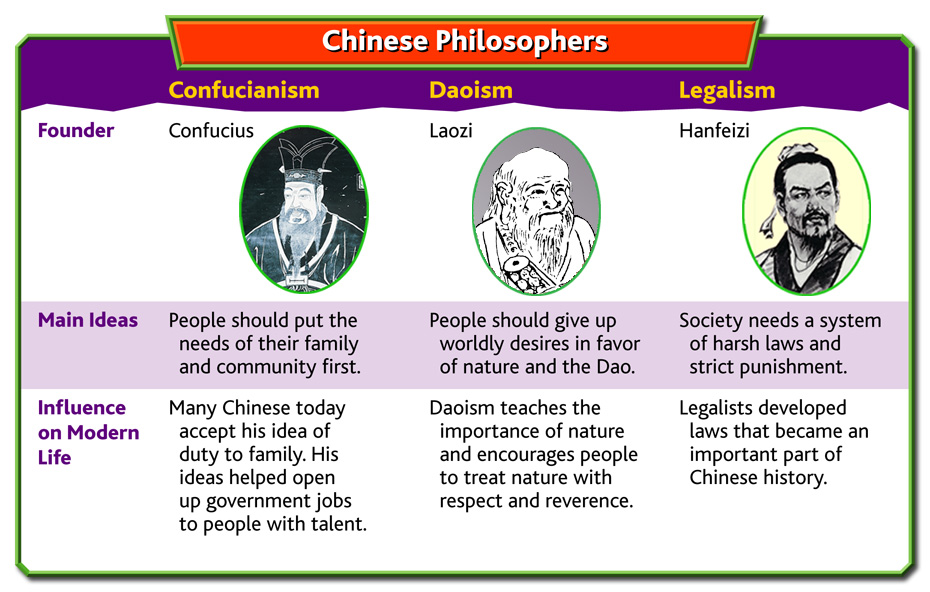WebQuest
Ancient China

Day 3: All aboard! Today explorers we will venture around the web and find out about Ancient Chinese thinkers and philosophies. The Chinese provided the world with many ideas on treating others. Who knows, maybe you are practicing Chinese philosophies right now.... Be sure to take notes along the way.
Between 500 B.C. and 200 B.C., Chinese thinkers developed three major theories about how to create a peaceful society. These theories are called Confucianism, Daoism, and Legalism.
Confucius believed that people needed to have a sense of duty. Duty meant that a person must put the needs of family and community before his or her own needs. Each person owed a duty to another person. Parents owed their children love, and children owed their parents honor. Husbands owed their wives support, and wives owed their husbands obedience. Above all, rulers had to set good examples. If a king ruled for the common good, his subjects would respect him and society would prosper.
Confucius believed that if each person did his or her duty, society as a whole would do well. He also urged people to be good and to seek knowledge: "There are those who act without knowing; I will have none of this. To hear a lot, choose the good, and follow it, to see a lot and learn to recognize it: this is next to knowledge." —Confucius, Analects
To Confucius, the best way to behave was similar to an idea known as the Golden Rule: “Do unto others as you would have others do unto you.” Confucius urged people to “measure the feelings of others by one’s own,” for “within the four seas all men are brothers.”
Confucius traveled through China trying to persuade government leaders to follow his ideas. Confucianism (kuhn• FYOO• shuh• NIH • zuhm) taught that all men with a talent for governing should take part in government. Of course, this idea was not popular with aristocrats, and few leaders listened.
Over time, Confucius won many followers who honored him as a great teacher. They wrote down his sayings and carried his message. After Confucius died in 479 B.C., his sayings spread throughout China.
The ideas of Daoism are written in Dao De Jing (The Way of the Dao). Like Confucianism, Daoism tells people how to behave. Daoists believed that people should give up worldly desires. They should turn to nature and the Dao—the force that guides all things. To show how to follow the Dao, Daoists used examples from nature: "Higher good is like water: the good in water benefits all, and does so without contention. It rests where people dislike to be, so it is close to the Way. Where it dwells becomes good ground; profound is the good in its heart, Benevolent the good it bestows."—Laozi, Tao Te Ching
In some ways, Daoism is the opposite of Confucianism. Confucius taught that people should work hard to improve the world. Daoism told people to give up their concerns about the world. It said they should seek inner peace and live in harmony with nature. Many Chinese followed both Confucianism and Daoism.
A scholar named Hanfeizi (HAN • fay • DZOO) developed the teachings of Legalism during the 200s B.C. Unlike Confucius or
Laozi, Hanfeizi taught that humans were naturally evil. He believed that the government needed to issue harsh laws and stiff
punishments to force them to do their duty. His followers believed that a strong ruler was needed to maintain order in society. Many aristocrats liked Legalism because it favored force and power, and did not require rulers to show kindness or understanding. Its ideas led to cruel laws and punishments for Chinese farmers.
After reading the above information, compare and contrast the three philosophies with your group. Then choose one of the philosophies and answer the following questions with your group:
1. Why do you believe that your chosen philosophy is the most important belief system in Chinese Culture?
2. Do you believe that your selected philosophy is still practiced? Why or why not?
3. If you had to choose how to live your life, which philosophy would you choose? Why?
Please make sure that each group member is ready to discuss these questions and your answers with the class
Materials: Computers with internet access, headphones, pencils, student journal.
The Public URL for this WebQuest:
http://zunal.com/webquest.php?w=298710
WebQuest Hits: 13,155
Save WebQuest as PDF
